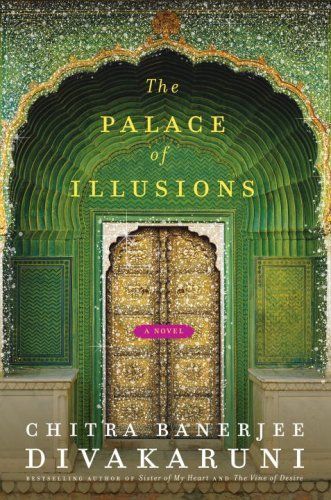
The Palace of Illusions
Relevant to today’s war-torn world, The Palace of Illusions takes us back to the time of the Indian epic The Mahabharat—a time that is half-history, half-myth, and wholly magical. Through her narrator Panchaali, the wife of the legendary five Pandavas brothers, Divakaruni gives us a rare feminist interpretation of an epic story.
The novel traces Panchaali’s life, beginning with her magical birth in fire as the daughter of a king before following her spirited balancing act as a woman with five husbands who have been cheated out of their father’s kingdom. Panchaali is swept into their quest to reclaim their birthright, remaining at the brothers’ sides through years of exile and a terrible civil war. Meanwhile, we never lose sight of her stratagems to take over control of her household from her mother-in-law, her complicated friendship with the enigmatic Krishna, or her secret attraction to the mysterious man who is her husband’s most dangerous enemy. Panchaali is a fiery female voice in a world of warriors, gods, and ever-manipulating hands of fate.
Reviews
altlovesbooks@altlovesbooks
Teeeeeesha@slytherinreads_s
Sarthak Verma@0xsarthak
Vishwa@vishwa
Trish@concerningnovelas
Omar@omareduardo
Vaishali Batra@mellowandmelyn
Abi Venukumar@abi
kanchan singh@kanchan89
Astha Prakash@asthaprakash
Sahi K@sahibooknerd
Jennifer@vivaldi
Aparna Eeshwar@sentranced
Bhagya@bhagya_bookcafe
sneha@sneha25
Nia Singh @nia_singh
Leesha Kashyap @koorkure
Ada@adayaaaaa
Rupal Shah @rooopal
sazha @hirenata
Vikrant Chaudhary@magreader
anikait@anikaittttt
Siddhi Nagda @siddhi_0394
Anisha yadav@aniisha5
Highlights
Omar@omareduardo
Page 258
Omar@omareduardo
Page 239
Omar@omareduardo
Page 63
Omar@omareduardo
Page 49
Caffeinatedbookss@caffeinatedbookss
Page 40
Caffeinatedbookss@caffeinatedbookss
Page 17
Caffeinatedbookss@caffeinatedbookss
Page 14